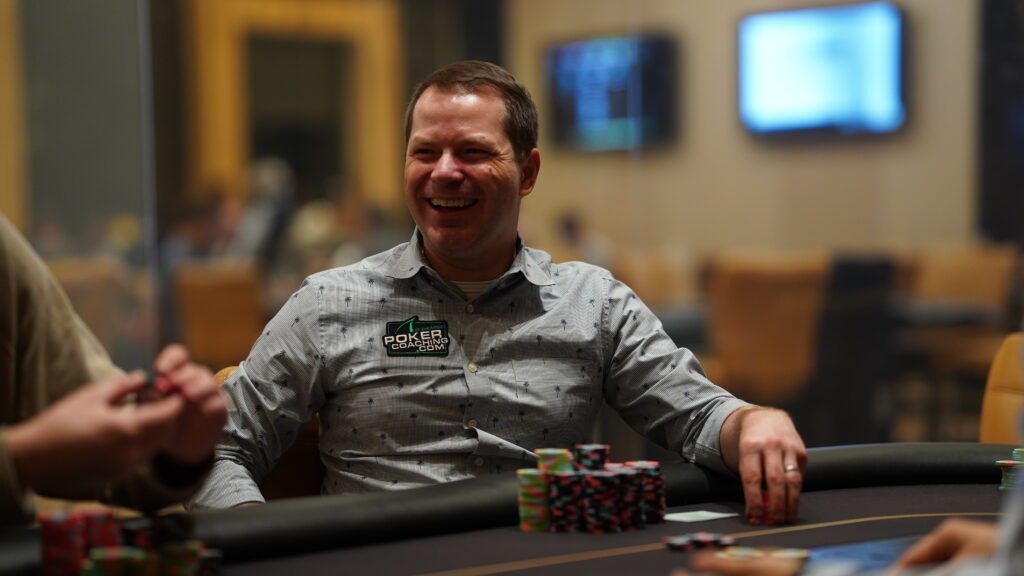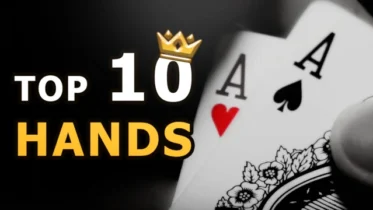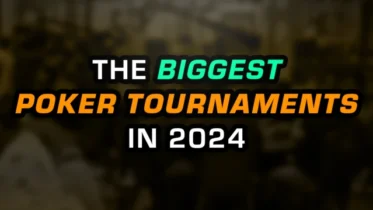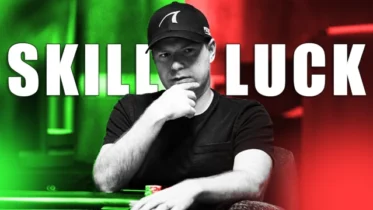Here’s another hand from the PokerCoaching Discord. Our hero, Matt, is in a $5/$5 no-limit hold’em cash game in the Los Angeles area, and is delighted to find K♥K♦UTG7 (traditionally called “UTG+1” – there are seven players yet to act). He opens to $25, and says:
“I upped my preflop raise size this hand, because the player to my left has a tell that demonstrated he liked his hand. I raised more under the ‘raise what you think they’ll call’ principle.”
Already I have a disagreement with Matt’s plan. If he thinks that the player to his left likes their hand, what a great time to limp/3-bet! The L.A. area is legendary for its loose gambly games, where massively multi-way flops, even for raises or 3-bets, are common. If Matt limps, the player on his left raises, and gets a caller or three, then Matt can drop a monster 3-bet on the field and make everybody’s life miserable. I’ve already written about that in an article on exploiting wide preflop ranges.
I said so in my initial response:
“If you think the player on your left likes his hand, then it’s the perfect time to go for a limp/3-bet. And this would have worked exquisitely, since there were three calls after the player you had a tell on. Visualize that person opening to $20, getting three calls, and now you make it $240. This is exactly how to exploit people who cold-call raises too wide, and L.A. is the perfect place to do it.”
But Matt opens, and gets (count ‘em) four callers, including the small blind (“SB”). Visualize the difficult situation Matt is in. Visualize how much cleaner things could have been for him had he limped and one of the field players had raised. Okay, onto the hand.
With $120 in the pot post-rake, the flop is 10♣-10♥-3♣. The SB checks, as does Matt.
This is absolutely the correct play. When you find yourself out-of-position to that many players, holding one pair, you must play defensively. Matt should literally be “checking range” (checking every single hand that got here). What he does after that can be discussed, but Matt’s check was spot-on.
Beware “The Sigh” In Live Poker Games
There is one more check and the cut-off (“CO”) B83 (bets 83% of the pot – $100). The button folds, and now:
“SB sighs and goes all-in for $170.”
The action is back on Matt.
“What should I do?”
I could hear the chuckles all over the Internet.
There is no more reliable tell in live poker than “The Sigh,” followed by a jam. It is invariably a monster.
Even without the SB’s sigh, Matt would be in an awkward spot. The CO sized up big, betting into four other players, in a spot where they should be betting small, if at all. The SB looked at that, and still wanted to put all their chips in, knowing that they had zero fold equity.
The others in the discussion felt the same way:
Dilly: “My first instinct is the SB is full of sh*t and has a ten here the vast majority of the time lol.”
BuffaloJr: “The ‘I’m so tilted about this board that I put all my money in’ behavior is a huge indication of strength.”

Common tells like sighing before making a play
or being talkative mid-hand a worth looking for.
With Pocket Kings in a Cash Game, what did Matt do?
Good poker hand posting etiquette requires that you pause an appropriate day or two before saying what you did, or the hand’s results. Otherwise, any discussion is invariably tainted by the fore-knowlege (it’s easy to say that the hero should fold if we know the opponent had the nuts). Matt is a veteran hand-poster and knows better than to reveal the results early. But when the time was right:
“RESULTS: I folded. Folds back to CO who tanks with a speech about how he doesn’t have a ten so this is really hard. CO mucks and SB flashes a ten as he drags the pot.
After the hand, I had the same thought about limp re-raise. I have never attempted a limp re-reraise, but this would have been a good spot.”
First, my congratulations to Matt for finding the fold here. Many players would have looked at those two cowboys, rationalized that the SB was on a club draw, and jumped right in. Against one player, particularly getting good pot odds and knowing you’re going to see a run-out, this wouldn’t be a terrible play. But Matt was squeezed between two players who were very interested in the pot, and he was correct to believe that he was drawing slim at that point.
Second, good for him for thinking about the limp/3bet idea right after the hand. He says he’s never done one, and I hope he’ll give it a try the next time the context seems right.

Read one of the highest regarded articles on the PokerCoaching.com blog: The Bankroll Bible
Serious Sixth Street Error
Finally, let’s back up to that part where we discovered that both Matt and the CO had made good folds…
“SB flashes a ten as he drags the pot.”
Apparently the SB, who won the pot, hadn’t read my recent piece in the PokerCoaching blog. They made Mistake #3 in the list of Five Sixth Street Mistakes That You’re Making – showing your cards when the other people fold.
What possible good can it do the SB to reveal that they did, indeed, have the dreaded trips? To pat their opponents on the shoulder for making good folds? To show that the shuffler likes them better?
All they did was make both of their opponents feel good about their play. Look at Matt – he made the unenviable decision to release a premium that you only get once every 200 hands or so. That might have gnawed at him for hours, but instead, he got instant confirmation that he was on his A-game, and ready for continued battle.
Here’s what I wrote in that article, and it’s worth remembering:
We play a game of imperfect information – don’t perfect your opponents’ information.
And, of course, all of us in the PokerCoaching Discord cash game discussion group appreciated that sixth street error by the SB. We all patted ourselves on the back and said what a bunch of sage and sharp poker players we are.
I hope you’ll come and join us over there – we are all sage and sharp.



